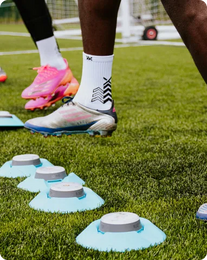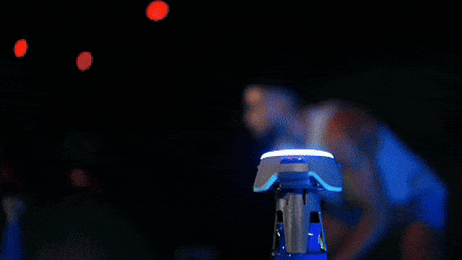Having multiple skills is essential for a soccer player. But soccer fitness is much more crucial if you want to excel in the game and dominate the field. Unless you’re fit, it becomes practically impossible to outrun your opponents and utilize the techniques you have to your advantage. Sorry to say this, but no matter how good your players are at ball control, dribbling, shooting, and all of that, they won’t add much value to the team if they lack soccer fitness training.

Balancing the two is vital. That’s why it’s essential for coaches and trainers to add soccer conditioning drills without ball to other workout activities. A well-rounded soccer conditioning program ensures players can sustain peak performance throughout the match.
What is Conditioning in Soccer?
Most people tend to confuse conditioning with strength building. While strength training is exercising to build your physical power, soccer fitness drills help improve endurance and cardiovascular efficiency. A solid soccer conditioning program trains and strengthens the heart and respiratory system, ensuring players maintain energy levels during intense competition.
Fatiguing during the game is natural, and it happens to both amateurs and pros. But if your players have to catch their breath every couple of seconds, it will be tough for them to play on a competitive level. Football workout routines help in building the high level of fitness that the game requires. Implementing conditioning drills for soccer helps build stamina, leading to greater endurance and confidence on the field.
It’s important to remember that players won’t always have possession of the ball in an actual match. That’s why a mix of soccer fitness training - both with and without the ball—is essential. Using BlazePod in soccer conditioning drills helps tackle key fitness gaps while improving reaction time and decision-making under pressure.
Soccer Conditioning Drills to Try Today
Pain Shuttles
Pain shuttles, also known as yo-yo’s or doggies, are among the most effective conditioning drills for soccer to boost endurance. This go-and-stop style exercise mimics the short sprints required in a match. Besides endurance, these drills also help develop speed, acceleration, deceleration, and agility. Adding a ball to the exercise increases a player’s ability to control the ball while sprinting.
On-Ball, Off-Ball Running Drills for Soccer
This drill is a must-have in any soccer fitness training program. It alternates between ball-handling drills and running without the ball, ensuring players develop both endurance and ball control under game-like conditions.
Step Jumps
Step jumps are excellent soccer fitness drills for building stamina while improving explosiveness and reaction time.
Torture Run Team Soccer Drills
Sprint-based soccer conditioning drills are essential for any training program. Adding cones for direction changes further enhances agility and footwork.
3-on-3 Force Marking Soccer Team Conditioning Drills
These soccer fitness drills train players to build defensive strength while developing effective tackling skills.
4-on-4 Touch the Line Soccer Conditioning Drills
High-intensity passing drills like these help players recover quickly while sharpening their ability to press opponents and win back possession before a goal-scoring opportunity arises.
Conclusion
BlazePod complements your team’s soccer conditioning program with its reaction training system. This innovative training kit includes Bluetooth-enabled Pods with bright LED lights, all controlled via the BlazePod app. The Pods are smash-proof, waterproof, and come with suction cups and straps, allowing for versatile setups. Whether used in soccer fitness drills or game-speed training, BlazePod pushes players to react faster and sustain peak performance.
When considering how often should soccer players do conditioning, BlazePod’s versatility ensures it fits seamlessly into any training plan, enhancing endurance, agility, and game-time decision-making.
























